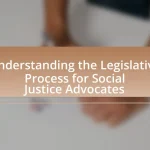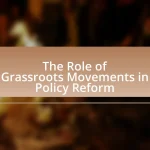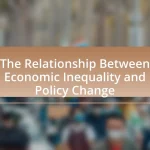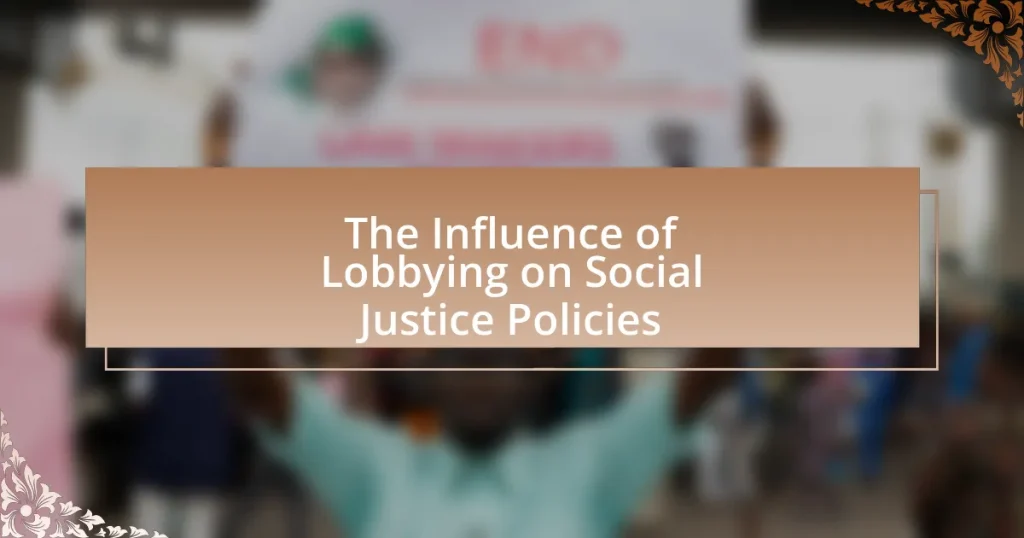The article examines the significant influence of lobbying on social justice policies, highlighting how organized interests shape legislative agendas and outcomes. It discusses various lobbying strategies, including grassroots and direct lobbying, and their impact on policy creation, public perception, and the prioritization of social justice issues. The article also addresses the ethical considerations surrounding lobbying, the role of interest groups, and the importance of transparency in advocacy efforts. Additionally, it explores the challenges in measuring lobbying’s influence and offers strategies for social justice advocates to counteract negative lobbying influences.

What is the Influence of Lobbying on Social Justice Policies?
Lobbying significantly influences social justice policies by shaping legislative agendas and outcomes. Through financial contributions, advocacy efforts, and strategic communication, lobbyists can promote specific social justice issues, such as racial equality, gender rights, and economic equity. For instance, organizations like the Human Rights Campaign and the NAACP actively lobby for policies that advance LGBTQ+ rights and racial justice, respectively, demonstrating the power of organized interests in affecting policy change. Research indicates that lobbying efforts can lead to the introduction of favorable legislation, as seen in the passage of the Equality Act in the U.S., which was heavily supported by lobbying from civil rights groups.
How does lobbying impact the creation of social justice policies?
Lobbying significantly influences the creation of social justice policies by shaping legislative agendas and prioritizing specific issues. Lobbyists represent various interest groups, including those advocating for marginalized communities, and they provide information, resources, and strategic support to policymakers. For instance, research by the Brennan Center for Justice indicates that lobbying efforts can lead to the introduction of bills that address social inequalities, such as criminal justice reform and healthcare access. Furthermore, the presence of well-funded lobbying organizations can amplify the voices of underrepresented groups, thereby increasing the likelihood that social justice issues receive legislative attention.
What are the key mechanisms through which lobbying influences policy decisions?
Lobbying influences policy decisions primarily through direct advocacy, information dissemination, and financial contributions. Direct advocacy involves lobbyists meeting with lawmakers to persuade them on specific issues, often providing tailored arguments that align with the interests of their clients. Information dissemination occurs when lobbyists supply research, data, and expert opinions to policymakers, shaping their understanding and framing the debate around particular policies. Financial contributions, often in the form of campaign donations, can create a favorable environment for lobbyists by increasing their access to decision-makers and enhancing their influence over legislative outcomes. For instance, a study by the Center for Responsive Politics found that in the 2020 election cycle, over $3.5 billion was spent on lobbying, demonstrating the significant financial resources dedicated to influencing policy.
How do different lobbying strategies affect social justice outcomes?
Different lobbying strategies significantly affect social justice outcomes by shaping policy decisions and public perceptions. For instance, grassroots lobbying, which mobilizes community members to advocate for social justice issues, often leads to more inclusive policies that reflect the needs of marginalized groups. In contrast, elite lobbying, which relies on direct access to policymakers and financial contributions, can prioritize the interests of powerful organizations over social equity. Research indicates that grassroots efforts have successfully influenced legislation, such as the 2010 Dodd-Frank Act, which aimed to address financial inequities, demonstrating the effectiveness of community-driven advocacy in achieving social justice goals.
Why is understanding lobbying important for social justice advocates?
Understanding lobbying is crucial for social justice advocates because it directly impacts the formulation and implementation of policies that affect marginalized communities. Lobbying shapes legislative agendas, influences decision-makers, and can either advance or hinder social justice initiatives. For instance, research by the Center for Responsive Politics shows that in 2020, over $3.5 billion was spent on lobbying in the United States, highlighting the significant resources dedicated to influencing policy outcomes. By comprehending the mechanisms and strategies of lobbying, social justice advocates can better navigate the political landscape, mobilize support, and advocate effectively for equitable policies.
What role does lobbying play in shaping public perception of social justice issues?
Lobbying plays a significant role in shaping public perception of social justice issues by influencing policymakers and public discourse. Through targeted campaigns, lobbyists advocate for specific social justice causes, often framing issues in ways that resonate with the public. For instance, organizations like the Human Rights Campaign utilize lobbying to promote LGBTQ+ rights, effectively raising awareness and altering public attitudes through strategic messaging and media engagement. Research indicates that increased lobbying efforts correlate with heightened public awareness and support for social justice initiatives, as seen in the rise of movements like Black Lives Matter, which gained traction partly due to lobbying efforts that highlighted systemic racism and police brutality.
How can advocates leverage lobbying to promote social justice?
Advocates can leverage lobbying to promote social justice by actively engaging with policymakers to influence legislation that addresses systemic inequalities. By presenting well-researched data and compelling narratives, advocates can highlight the urgent need for reforms in areas such as education, healthcare, and criminal justice. For instance, the American Civil Liberties Union (ACLU) has successfully lobbied for criminal justice reform by providing evidence of racial disparities in incarceration rates, which has led to legislative changes in several states. This strategic approach not only raises awareness but also mobilizes public support, creating a stronger case for social justice initiatives.
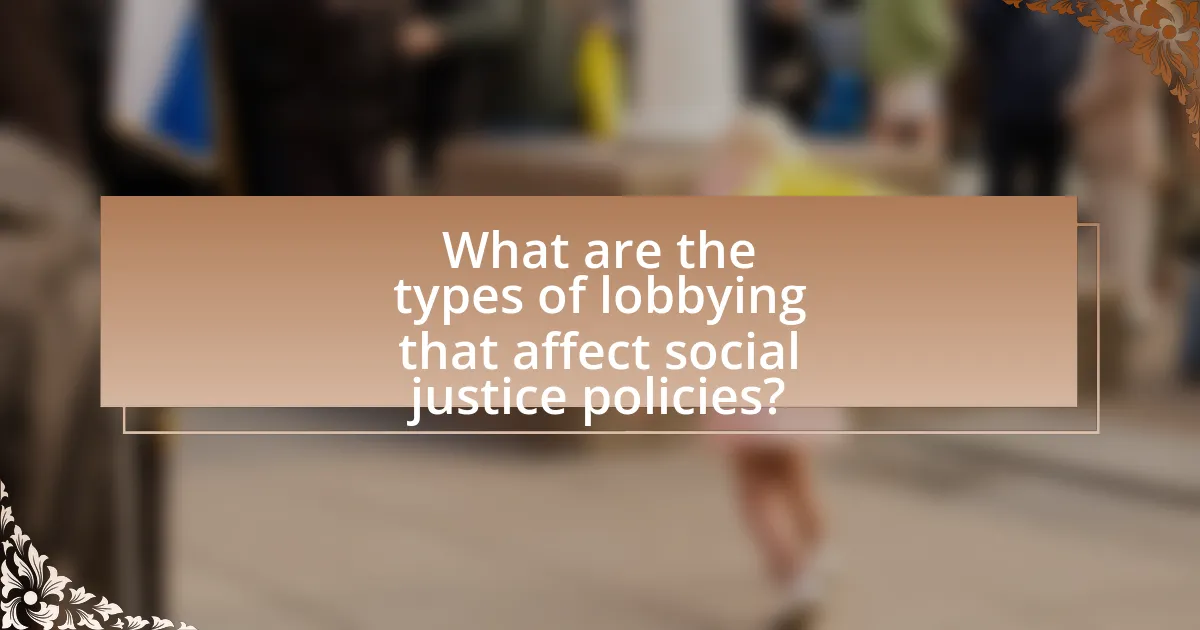
What are the types of lobbying that affect social justice policies?
The types of lobbying that affect social justice policies include grassroots lobbying, direct lobbying, and coalition lobbying. Grassroots lobbying involves mobilizing the public to advocate for specific social justice issues, often through campaigns that encourage constituents to contact their representatives. Direct lobbying refers to efforts by individuals or organizations to influence policymakers directly, typically through meetings, phone calls, or written communications. Coalition lobbying occurs when multiple organizations or groups come together to advocate for a common social justice cause, amplifying their collective voice and resources. These lobbying types significantly shape the legislative landscape by promoting awareness and influencing decision-making processes related to social justice.
What are the differences between direct and indirect lobbying?
Direct lobbying involves direct interaction between lobbyists and lawmakers or government officials to influence legislation or policy decisions. In contrast, indirect lobbying seeks to influence public opinion or mobilize constituents to pressure lawmakers through grassroots campaigns, media outreach, or public relations efforts. For example, direct lobbying may include meetings, phone calls, or written communications with legislators, while indirect lobbying often involves organizing rallies, social media campaigns, or public advertisements to sway public sentiment and encourage constituents to contact their representatives.
How does direct lobbying specifically target policymakers?
Direct lobbying specifically targets policymakers by engaging them directly through personal meetings, phone calls, and tailored communications to influence their decisions on legislation. This approach allows lobbyists to present specific information, arguments, and data that align with their interests, thereby shaping the policymakers’ perspectives and priorities. For instance, the American Civil Liberties Union (ACLU) employs direct lobbying to advocate for social justice policies, effectively communicating the implications of proposed laws on civil rights. This method is effective because it fosters relationships and trust between lobbyists and policymakers, increasing the likelihood of favorable outcomes for the interests being represented.
What are the implications of indirect lobbying on public opinion?
Indirect lobbying significantly shapes public opinion by influencing perceptions and attitudes toward specific issues without direct engagement with policymakers. This form of lobbying often utilizes media campaigns, grassroots mobilization, and public relations strategies to sway public sentiment. For instance, research indicates that indirect lobbying can lead to increased awareness and support for social justice issues, as seen in campaigns advocating for racial equality and environmental justice. A study by the Pew Research Center found that public opinion on climate change shifted notably following extensive media coverage and advocacy efforts, demonstrating the power of indirect lobbying in shaping societal views.
What role do interest groups play in lobbying for social justice?
Interest groups play a crucial role in lobbying for social justice by advocating for policies that promote equity and address systemic inequalities. These organizations mobilize resources, conduct research, and engage in grassroots campaigns to influence lawmakers and public opinion. For instance, groups like the American Civil Liberties Union (ACLU) have successfully lobbied for legislation that protects civil rights, demonstrating the effectiveness of organized advocacy in shaping social justice outcomes. Their efforts often include providing expert testimony, drafting policy proposals, and leveraging public support to create pressure on decision-makers, thereby facilitating legislative changes that align with social justice goals.
How do interest groups prioritize social justice issues in their lobbying efforts?
Interest groups prioritize social justice issues in their lobbying efforts by aligning their agendas with the needs of marginalized communities and leveraging public support to influence policy. They conduct research to identify pressing social justice concerns, such as racial inequality, gender discrimination, and economic disparities, which helps them focus their lobbying strategies effectively. For example, organizations like the American Civil Liberties Union (ACLU) prioritize issues based on their potential impact on civil rights and social equity, often mobilizing grassroots campaigns to amplify their voices. This strategic prioritization is supported by data showing that public opinion increasingly favors social justice initiatives, compelling interest groups to advocate for policies that resonate with broader societal values.
What are some examples of successful interest group lobbying for social justice?
Successful interest group lobbying for social justice includes the efforts of organizations like the American Civil Liberties Union (ACLU), which has effectively advocated for civil rights legislation, including the repeal of discriminatory laws and the promotion of LGBTQ+ rights. Another example is the National Association for the Advancement of Colored People (NAACP), which has played a crucial role in lobbying for voting rights protections and criminal justice reform, significantly influencing legislation such as the Voting Rights Act. Additionally, the Human Rights Campaign has successfully lobbied for marriage equality, culminating in the Supreme Court’s decision in Obergefell v. Hodges, which legalized same-sex marriage nationwide. These examples demonstrate how organized lobbying efforts can lead to substantial advancements in social justice policies.
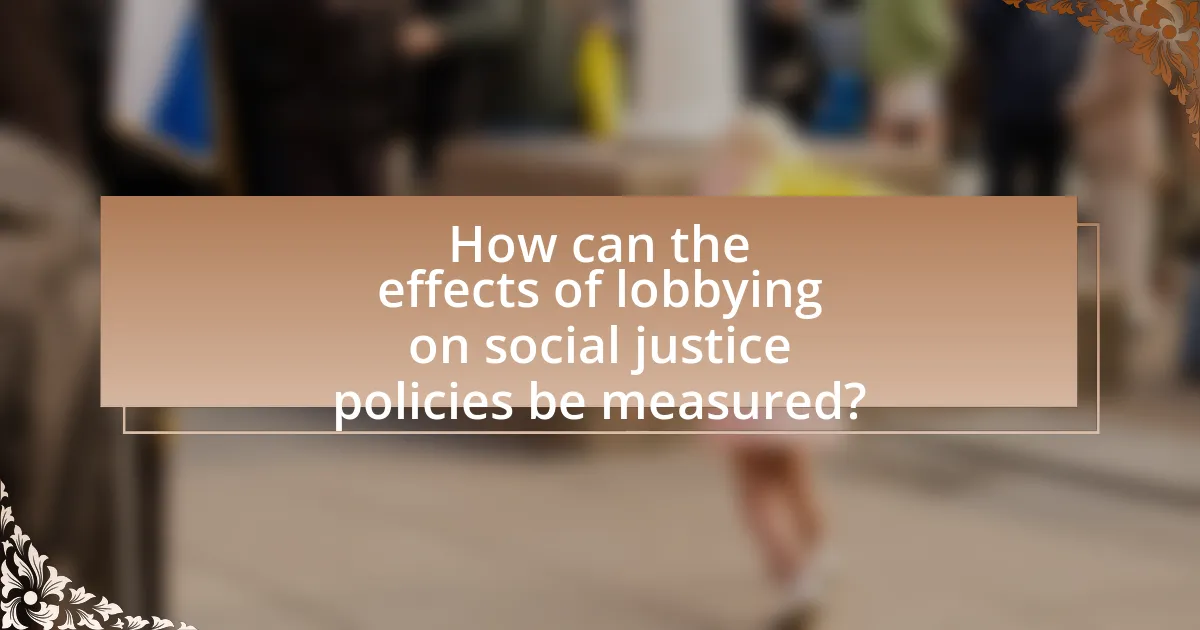
How can the effects of lobbying on social justice policies be measured?
The effects of lobbying on social justice policies can be measured through quantitative analysis of policy outcomes, stakeholder surveys, and case studies. Quantitative analysis involves examining legislative changes and their correlation with lobbying expenditures, such as the 2018 study by the Center for Responsive Politics, which found that increased lobbying spending often aligns with favorable policy outcomes for specific interest groups. Stakeholder surveys can assess perceptions of lobbying effectiveness among affected communities, providing qualitative insights into the lobbying process. Additionally, case studies of specific social justice initiatives, like the lobbying efforts surrounding the Equality Act, can illustrate the direct impact of lobbying on policy formulation and implementation. These methods collectively provide a comprehensive framework for evaluating the influence of lobbying on social justice policies.
What metrics are used to evaluate the impact of lobbying on policy outcomes?
Metrics used to evaluate the impact of lobbying on policy outcomes include legislative success rates, changes in policy language, and the frequency of meetings between lobbyists and policymakers. Legislative success rates measure the percentage of proposed legislation that is passed after lobbying efforts, indicating direct influence. Changes in policy language reflect how lobbying can shape the specifics of legislation, demonstrating the effectiveness of advocacy. The frequency of meetings between lobbyists and policymakers serves as a quantitative measure of engagement, suggesting the level of access and potential influence lobbyists have on decision-makers. These metrics provide a comprehensive framework for assessing the effectiveness of lobbying in shaping policy outcomes.
How do researchers assess the effectiveness of lobbying efforts?
Researchers assess the effectiveness of lobbying efforts by analyzing changes in policy outcomes, legislative behavior, and public opinion. They often utilize quantitative methods, such as statistical analysis of voting records and policy changes, to determine correlations between lobbying activities and legislative results. For instance, a study published in the American Economic Journal found that increased lobbying expenditures significantly correlated with favorable legislative outcomes for specific interest groups. Additionally, qualitative methods, including interviews with policymakers and lobbyists, provide insights into the perceived influence of lobbying on decision-making processes. This combination of quantitative and qualitative approaches allows researchers to draw comprehensive conclusions about the impact of lobbying on social justice policies.
What challenges exist in measuring lobbying’s influence on social justice?
Measuring lobbying’s influence on social justice faces significant challenges due to the complexity of social justice issues and the multifaceted nature of lobbying activities. The difficulty arises from the lack of clear metrics to quantify social justice outcomes, as these outcomes often involve qualitative changes in societal attitudes and behaviors rather than easily measurable economic indicators. Additionally, the influence of lobbying can be indirect and diffuse, making it hard to establish a direct causal link between lobbying efforts and specific social justice advancements. Research indicates that the interplay of various stakeholders, including grassroots movements and public opinion, further complicates the assessment of lobbying’s impact. For instance, a study by the Brennan Center for Justice highlights that the effects of lobbying are often overshadowed by broader social movements, making it challenging to isolate the specific contributions of lobbying to social justice initiatives.
What are the ethical considerations surrounding lobbying in social justice?
The ethical considerations surrounding lobbying in social justice include transparency, accountability, and the potential for disproportionate influence by wealthy interests. Transparency is crucial as it ensures that lobbying activities are disclosed, allowing the public to understand who is advocating for specific policies and why. Accountability is necessary to hold lobbyists and policymakers responsible for their actions, particularly when those actions may harm marginalized communities. Additionally, the risk of disproportionate influence arises when affluent organizations or individuals can exert more power over the legislative process, potentially sidelining the voices of those most affected by social justice issues. This concern is supported by research indicating that lobbying efforts often favor established interests, which can lead to policies that do not adequately address the needs of disadvantaged populations.
How can transparency in lobbying practices enhance social justice advocacy?
Transparency in lobbying practices can enhance social justice advocacy by ensuring that the interests and actions of lobbyists are visible to the public and policymakers. When lobbying activities are transparent, it allows for greater accountability, enabling advocates to identify which organizations are influencing legislation and to what extent. For instance, research from the Center for Responsive Politics indicates that increased transparency in lobbying correlates with more equitable policy outcomes, as it empowers marginalized communities to engage in the political process and hold decision-makers accountable. This visibility can lead to more informed public discourse and ultimately foster policies that better reflect the needs of diverse populations.
What are the potential negative consequences of unethical lobbying?
Unethical lobbying can lead to significant negative consequences, including the erosion of public trust in government institutions. When lobbyists engage in deceptive practices or prioritize corporate interests over public welfare, it undermines the democratic process and can result in policies that favor a select few rather than the broader population. For instance, a study by the Center for Responsive Politics found that industries with heavy lobbying expenditures often receive favorable legislation, which can exacerbate social inequalities and hinder progress on social justice issues. Additionally, unethical lobbying can create a regulatory environment that is more conducive to corruption, as decision-makers may be swayed by financial incentives rather than the needs of their constituents.
What strategies can social justice advocates employ to counteract negative lobbying influences?
Social justice advocates can employ grassroots mobilization, coalition-building, and strategic communication to counteract negative lobbying influences. Grassroots mobilization involves engaging community members to raise awareness and advocate for policy changes, effectively amplifying their voices against powerful lobbying interests. Coalition-building allows advocates to unite various organizations and stakeholders, creating a stronger front to challenge negative influences collectively. Strategic communication focuses on framing issues in a way that resonates with the public and policymakers, utilizing social media and traditional media to disseminate counter-narratives that highlight the adverse effects of negative lobbying on social justice. These strategies have been shown to enhance the effectiveness of advocacy efforts, as evidenced by successful campaigns that have shifted public opinion and influenced legislative outcomes.
How can grassroots movements effectively challenge powerful lobbyists?
Grassroots movements can effectively challenge powerful lobbyists by mobilizing community support, leveraging social media for awareness, and advocating for policy changes through direct engagement with lawmakers. For instance, the Fight for $15 movement successfully organized fast-food workers to demand a $15 minimum wage, gaining significant public attention and influencing local and state legislation. This demonstrates that grassroots efforts can create pressure on policymakers, countering the financial influence of lobbyists. Additionally, studies show that grassroots campaigns can increase voter turnout and public engagement, further amplifying their impact against established lobbying interests.
What role does public engagement play in mitigating lobbying’s impact on social justice?
Public engagement plays a crucial role in mitigating lobbying’s impact on social justice by empowering citizens to influence policy decisions and hold lawmakers accountable. When the public actively participates in discussions, advocacy, and decision-making processes, it creates a counterbalance to the often disproportionate influence of lobbyists representing specific interests. For instance, grassroots movements and public campaigns can raise awareness about social justice issues, mobilizing community support and pressuring legislators to prioritize equitable policies. Research indicates that increased public participation in the political process leads to more representative outcomes, as seen in the 2018 midterm elections in the United States, where higher voter turnout correlated with a greater focus on social justice issues. This demonstrates that when citizens engage, they can effectively challenge the narratives and priorities set by lobbyists, fostering a more just and equitable society.
